Related Research Articles

Aberdeen City Council represents the Aberdeen City council area of Scotland.

East Dunbartonshire is one of the 32 council areas of Scotland. It borders the north-west of Glasgow and contains many of the affluent areas to the north of the city, including Bearsden, Milngavie, Balmore and Torrance, as well as many of the city's commuter towns and villages. East Dunbartonshire also shares borders with North Lanarkshire, Stirling and West Dunbartonshire. The council area covers parts of the historic counties of Dunbartonshire, Lanarkshire and Stirlingshire.

Renfrewshire is one of the 32 council areas of Scotland.
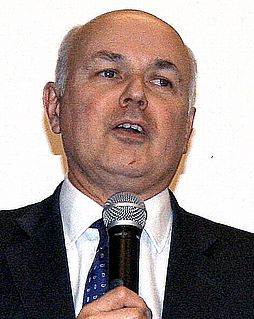
Local elections took place in various parts of the United Kingdom on 1 May 2003, the same day as the Scottish Parliamentary and the Welsh Assembly elections. There were local elections for all councils in Scotland and in most of England. There were no elections in Wales, Northern Ireland or London.

Berwickshire, Roxburgh and Selkirk is a constituency of the British House of Commons, located in the south of Scotland within the Scottish Borders council area. It elects one Member of Parliament (MP) at least once every five years using the first-past-the-post system of voting.

The politics of the Highland council area in Scotland are evident in the deliberations and decisions of the Highland Council, in elections to the council, and in elections to the House of Commons of the Parliament of the United Kingdom (Westminster) and the Scottish Parliament (Holyrood). In the European Parliament the area was within the Scotland constituency, which covers all of the 32 council areas of Scotland.
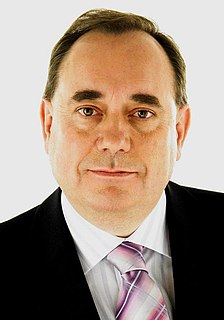
The 2012 Scottish local elections, were held on 3 May 2012 in all 32 local authorities. The Scottish National Party (SNP) overtook Labour to win the highest share of the vote, and retained and strengthened its position as the party with most councillors. Labour also made gains, while the Liberal Democrats experienced meltdown, losing over half their seats and falling behind the Conservatives. For the first time since the introduction of the Single Transferable Vote system, the SNP won majority control of 2 councils, from no overall control. Labour also won majority control of 2 councils from no overall control, while retaining majority control over 2 councils.

Midlothian South, Tweeddale and Lauderdale is a constituency of the Scottish Parliament (Holyrood) covering parts of the council areas of Midlothian and Scottish Borders. Since the 2011 election, it has elected one Member of the Scottish Parliament (MSP) by the plurality method of election. Also, however, it is one of nine constituencies in the South Scotland electoral region, which elects seven additional members, in addition to nine constituency MSPs, to produce a form of proportional representation for the region as a whole.

Elections to Scottish Borders Council were held on 3 May 2012, the same day as the other Scottish local government elections. The election used the 11 wards created as a result of the Local Governance (Scotland) Act 2004, with each ward electing three or four Councillors using the single transferable vote system, a form of proportional representation, with 34 Councillors elected.
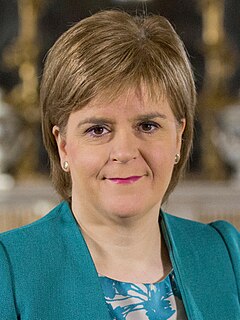
The 2017 Scottish local elections were held on Thursday 4 May, in all 32 local authorities. The SNP retained its position as the largest party in terms of votes and councillors, despite suffering minor losses. The Conservatives made gains and displaced Labour as the second largest party, while the Liberal Democrats suffered a net loss of councillors despite increasing their share of the vote. Minor parties and independents polled well; and independent councillors retained majority control over the three island councils. For the first time since the local government reforms in 1995, all mainland councils fell under no overall control.
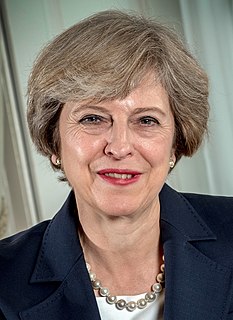
The 2017 United Kingdom local elections were held on Thursday 4 May 2017. Local elections were held across Great Britain, with elections to 35 English local authorities and all councils in Scotland and Wales.
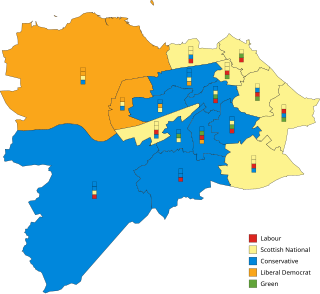
The most recent elections to the City of Edinburgh Council were held on Thursday 4 May 2017, on the same day as the 31 other local authorities in Scotland. It was the third successive Local Council election to run under the single transferable vote (STV) electoral system.

The 2017 Welsh local elections were held on 4 May 2017 to elect members of all 22 local authorities in Wales. This included the Isle of Anglesey, which was previously up for election in 2013 due to having its elections delayed for a year. Community council elections also took place on the same day. These local elections were held as part of the 2017 local elections in the United Kingdom. Apart from Anglesey, the last elections were held in 2012. Normally these elections take place every four years, but the 2017 elections were postponed for a year in order to avoid clashing with the 2016 Welsh Assembly election, which itself had been postponed by a year to avoid clashing with the 2015 general election.
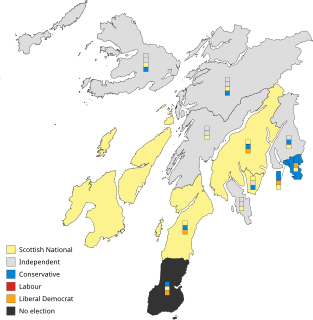
The 2017 Argyll and Bute Council elections took place on 4 May 2017 alongside local elections across Scotland. This was the third local election to take place using the Single Transferable Vote electoral system.

Elections to Stirling Council were held on 4 May 2017, the same day as the 31 other local authorities in Scotland. The election used the seven wards created under the Local Governance (Scotland) Act 2004, with 23 councillors being elected, an increase of 1 from 2012. Each ward elected either 3 or 4 members, using the STV electoral system. Following the Fifth Electoral Review by the Local Government Boundary Commission for Scotland, minor changes were made to several of the ward boundaries and one additional Councillor was added moving the total number of Councillors from twenty-two to twenty-three.
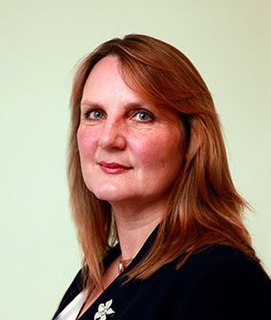
Elections to Scottish Borders Council were held on 4 May 2017, the same day as the other Scottish local government elections. The election used the 11 wards created as a result of the Local Governance (Scotland) Act 2004, with each ward electing three or four Councillors using the single transferable vote system, a form of proportional representation, with 34 councillors elected.
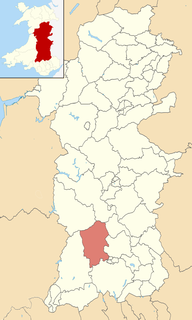
Yscir is the name of an electoral ward in southern Powys, Wales. It covers three local government communities and elects a councillor to Powys County Council.
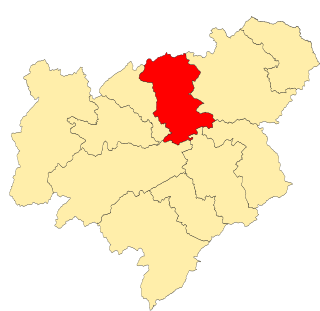
Leaderdale and Melrose is one of the eleven wards used to elect members of the Scottish Borders Council. It elects three Councillors.
References
- ↑ "View registration - The Electoral Commission". search.electoralcommission.org.uk. Retrieved 14 April 2019.
- ↑ View registration Borders Party Electoral Commission Register of Political Parties
- ↑ "Campaigners to seek council seats". BBC News . 18 April 2006.
- 1 2 "New party set for official launch". BBC News. 16 October 2006.
- ↑ "Borders faces its own North-South divide". The Scotsman. 7 April 2012. Retrieved 10 August 2016.
- ↑ "Independents suffer heavy losses". BBC News. 4 May 2007.
- ↑ "Borders Party reveals May election line-up". The Southern Reporter. 13 January 2012. Retrieved 10 August 2016.
- ↑ "New coalition to run Scottish Borders Council after governing deal struck". STV News . 12 May 2012. Retrieved 10 August 2016.
- ↑ "Borders Party leader Nicholas Watson to step down". BBC News. 30 August 2012.
- ↑ "Borders Party councillor resigns from SBC". Peebleshire News. 1 February 2013. Retrieved 13 July 2016.
- ↑ "Borders Party's Iain Gillespie wins Leaderdale and Melrose by-election". BBC News. 3 May 2013.
- ↑ "Pye stands for the Borders Party". Peebleshire News. 20 August 2013. Retrieved 10 August 2016.
- ↑ "Councillors by Party: Borders Party member of the Independent group". Scottish Borders Council. Retrieved 13 July 2016.
- ↑ Hodgson, Callum (29 March 2017). "Candidates announced for May's local government elections". Border Telegraph. Retrieved 5 May 2017.
- ↑ "View registration - the Electoral Commission".